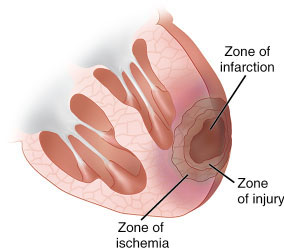myocardial infarction n heart attack
* * *
death of a segment of heart muscle, which follows interruption of its blood supply (see coronary thrombosis). Myocardial infarction is usually confined to the left ventricle. The patient experiences a 'heart attack': sudden severe chest pain, which may spread to the arms and throat. The main danger is that of ventricular fibrillation, which accounts for most of the fatalities. Other arrhythmia are also frequent; ectopic beat in the ventricle are especially important as they predispose to ventricular fibrillation. Other complications include heart failure, rupture of the heart, phlebothrombosis, pulmonary embolism, pericarditis, shock, mitral incompetence, and perforation of the septum between the ventricles.
The best results from the management of patients with myocardial infarction follow mobile and hospital-based coronary care with facilities for the early detection, prevention, and treatment of arrhythmias and cardiac arrest. Most survivors of myocardial infarction are able to return to a full and active life, including those who have been successfully resuscitated from cardiac arrest.
* * *
(MI) gross necrosis of the myocardium as a result of interruption of the blood supply to the area; it is almost always caused by atherosclerosis of the coronary arteries, upon which coronary thrombosis is usually superimposed.
 Myocardial infarction shown in cross-section of heart (ventricles only).
Myocardial infarction shown in cross-section of heart (ventricles only).
Medical dictionary. 2011.